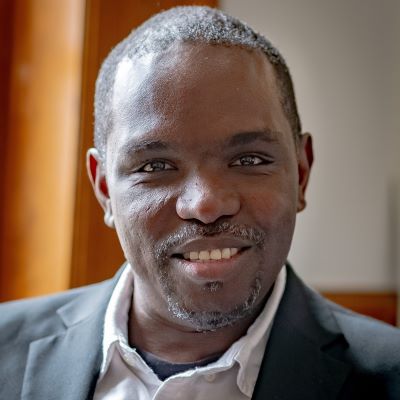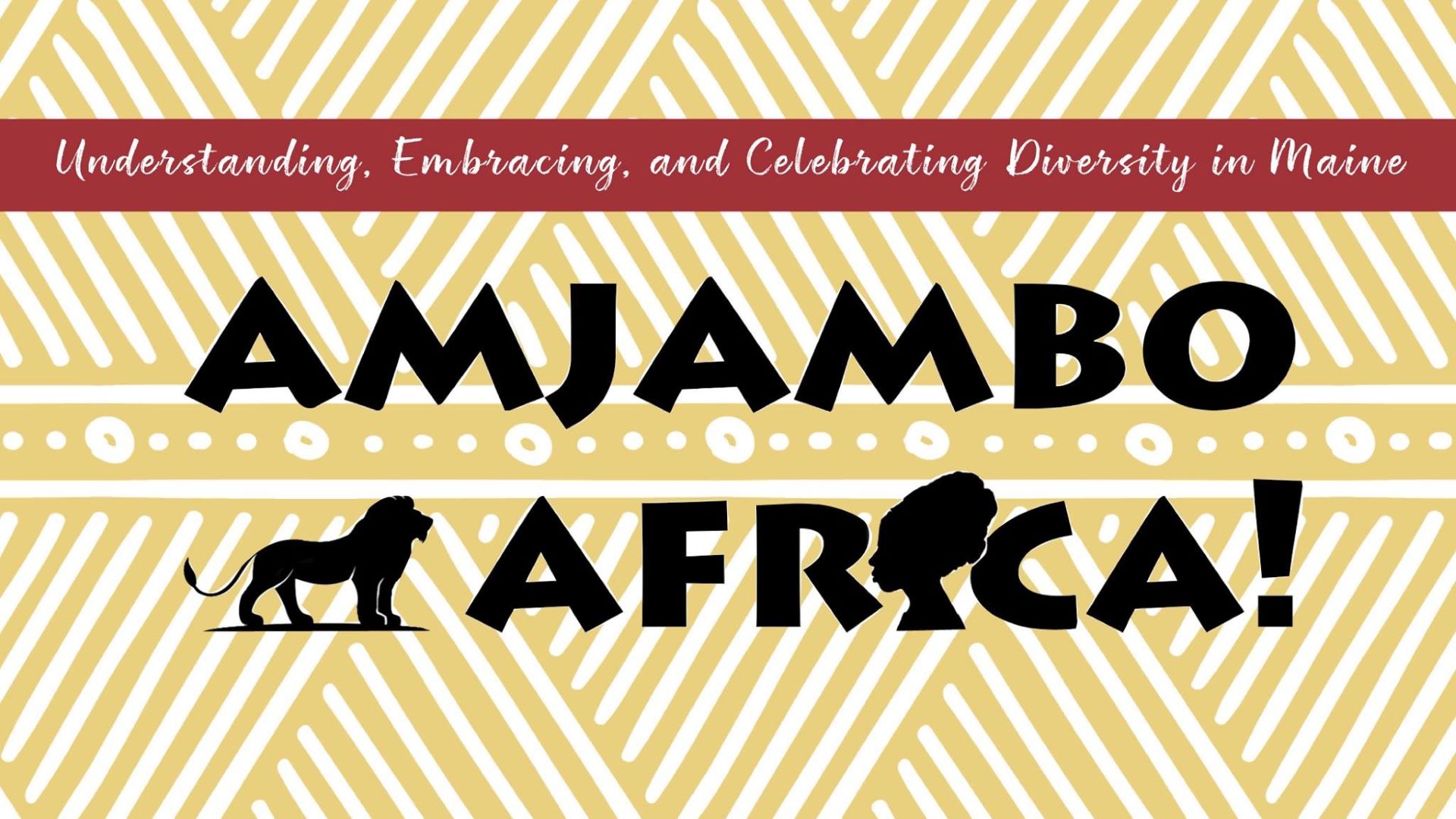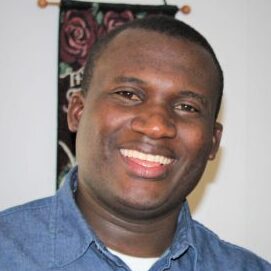Umaru Balde sat with Jean Hakuzimana of Amjambo Africa to talk about his new position as Portland’s first Director of Justice, Diversity, Equity, and Inclusion.
Questions from Amjambo Africa are bolded, with Balde’s responses thereafter.
Welcome! I know you are new to Maine. And this is a new position — so you are a pioneer. What attracted you to this position, and made you decide to accept it?
I have been a civil rights activist and advocate for a long time. I started back in the Middle East in 1999. When I came to the United States as an international student, I continued to advocate for civil rights, including those of immigrants and refugees. That led me to join the American Civil Liberties Union (ACLU) as a board member in Iowa, where I was living, and then the United Nations Association [of the USA] as well.

I became a civil rights investigator with the city of Cedar Rapids, which is the second largest city in Iowa and has lots of immigrants.
When I saw this position advertised, I thought I might be able to help bring about some positive change to the city. And then when I looked up the statistics of the school districts here and saw how many different languages and how diverse parts of Maine are, that pulled me in.
How are the early days going for you? What are your plans?
I’m in the learning process, basically learning the city and how the city as an organization operates and getting to know the stakeholders in the community — the community leaders and organizations.
I want to build collaboration and hopefully work as a team. I need a team to be able to create change … an avenue or platform for dialogue between the community and the city’s leadership. That is the number one thing. And then we’ll go from there.
What would you say is so important about having a DEIJ director position in a city like Portland?
I think any city that does not have this department is missing a huge piece … having a DEIJ department basically shows that the city is trying to be inclusive and bring about social change — that the city actually cares about social justice … I think what the city council did in creating this position was a very big move … I think this was missing.
I think that any city, regardless of size, needs a department of DEI. Unfortunately, we have seen certain cities and states trying to go against that, saying they don’t need diversity trainings or want to spend money on that kind of thing.
But it is necessary. If we look at Portland, for example, with the numbers of immigrants coming here — and I hope and pray that a lot of these asylum seekers get some type of permanent residence status — within five years, a lot of these people will become citizens and they will be voters.
The demographics are changing very dramatically and very quickly. And so these people will be part of the decision-makers of the future.
To some, the diversity is a threat. What is your take on that?
That is very understandable. People as human beings, we all are afraid of what we don’t know. There is a saying that if you get to know somebody, it’s almost impossible to hate them, or to not like them … . The world is evolving. The population is evolving. People are changing. Everything around us is changing every day.
If you are afraid or worried about becoming a minority … you have to deal with that. It is time for everybody to learn from each other … it doesn’t matter what your ethnic background or racial background is, if you trace it back, you’ll see that we all have some type of mixture.
So why don’t we all just open our minds and be willing to learn and talk to people that you would not have talked to before? Because now in Maine you are seeing people that you did not see before.
We’re seeing grocery stores that we did not have 20 years ago. And we are mixing with people in our parks, our pools, everywhere we go that we didn’t mix with 10, 20 years ago. … You don’t have to like everybody, but you should learn to know the people that you work with or deal with on a daily basis.
What are your thoughts on how we can achieve durable, sustainable peace, harmony, and integration among different ethnic and racial communities and groups?
I think creating a platform to be able to have a dialogue is very important. It’s key. For example, recently I was at a very beautiful event put together by the Jewish Community Alliance here and the Immigrant Welcome Center.
The dinner was interfaith, basically a dinner with Muslims and Jews coming together. This is exactly what we need to do. Everyone coming together, Muslims and Jews, and people from other faith groups. Having dinner together in Maine — even while over in Palestine, Jewish people and Muslim people are killing each other. We can do it differently here. That is what we need in every aspect of society.
Do you think people understand what is meant by diversity, equity, inclusion, and justice?
People confuse diversity with equity, and equity with inclusion. But these are completely different terms. They serve different purposes. We can be as diverse as possible racially, ethnically, gender wise, sexually — all that stuff. But that does not mean we are applying justice to everybody.
Diversity and justice are different things. Inclusion and diversity are different things … when you’re talking about diversity, people think, “Oh wow, they’re trying to bring all kinds of people from other countries and other cultures to take over.”
But that’s not it, not what is happening. No one is trying to take over anything. Everybody’s just wanting to share … people need to understand that diversity is not just seeing people of different colors.
It’s people putting together their skills and their resources, even if they are different races, different genders, come from different social backgrounds — poor, rich, and everyone working together.
There is a lot of resistance to change in many people.
Historically [fear of becoming the minority group] has been looked at as something very negative, because oppression happens to those who are less powerful, less united, less visible in the community.
So when … the oppressor starts feeling that, well, in the future we might fall into the minority group, and then maybe the minority group will become the majority — what if they do to us what we did to them?
The feeling of owning this country by force and by power, it’s within some people’s veins.
That is very hard to change. Some people are willing to learn … but some people are not. Some people are just too afraid … To be violent, to be oppressive to others, to be very aggressive toward others — that’s how a weak person acts just to mask their weakness by becoming an oppressive and aggressive person. …
A lot of people would be willing to come and talk to me and say, “Hey, this is what I don’t understand. What are you doing here? Can you explain it to me?” And then we could talk. We could have a dialogue.
I’ve seen many people in the white community who have had a chance to be abroad, to be outside of the U.S., come back with a totally changed mindset.
So I want to ask how your department is going to inform a broad range of other municipal departments, like the police, and the schools. How are you going to impact them strategically? How are you going to try to cooperate with them?
I don’t know if you saw, but I have a whole list on my whiteboard in my office of all these departments and organizations. The police and the fire department and the [Maine Department of] Health and Human Services. And there are other external stakeholders that I have to collaborate with.
For example, your organization, and others that advocate for immigrants, refugees, minorities … my thinking is my city manager and I will sit and draw out a plan of action. She and I will be working together … we’ll be going out to community, listening to people … a listening tour. And gathering solid data on the community.
Historically, what have been the barriers to a civil dialogue? What led to the recent protests, and how have things progressed? And then from there … we set priorities on items or issues that are most pressing for the community.
I want to thank you for your time today.
I appreciate my time with you … My door is open … I would like to get to know people. It would be good also for people to get to know me. I don’t care what their backgrounds are … let’s have a conversation.
I think that will help a lot, because my position is not only for a certain group of people, it’s for everybody. And we’re in a public space. It’s the city hall, which is for every resident of this city.
It’s not only for Umaru, who has a key now. It’s for everybody who lives here, who pays taxes here. You’re welcome to come talk to me. So that is my offer.
This piece first appeared in Amjambo Africa, a print and digital publication that serves new immigrants to Maine. It is republished with permission.







